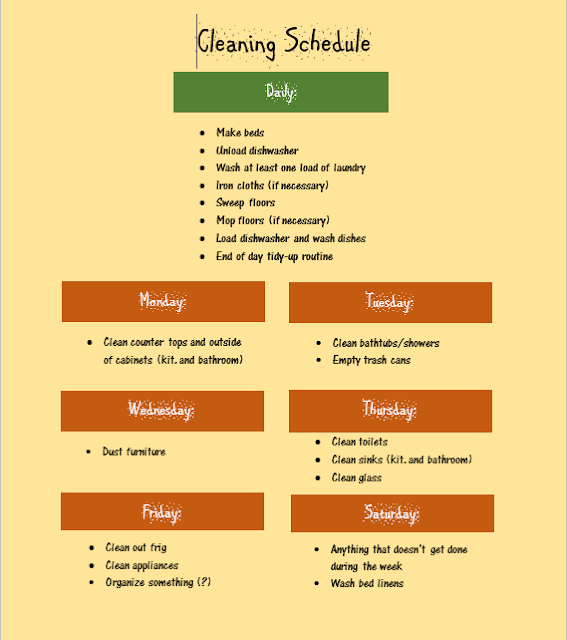During my last post, I promised I would share some of
my tips for cleaning and organizing. If you are busy and can’t afford to hire a
housekeeper (like me), you know how hard it is to keep up with all the
housework. There is not a day that goes by in my house when there isn't a sink
full of dirty dishes, or a basket of dirty laundry. This tells me that if I
decide not to do the laundry for a day, then I’ll have double the amount to do
the next day. This is just simple math, people.
In the past, I would set aside one day each week and
dedicate it to cleaning. I’m not talking about dishes and laundry. I’m
referring to mopping, dusting, cleaning bathtubs and toilets – the lengthier
cleaning tasks. I work five days a week, so I don’t have time to clean like
that until the weekend. Since me and my family attend church on Sunday, and we
try to honor the Sabbath, that left me with Saturday. You might think this
sounds logical enough, and one cleaning day each week isn't so bad. I, on the
other hand, dreaded seeing Saturday come. Not only was Saturday one of the only
two days my family could spend quality time together, but after working all
week long, the last thing I wanted to do was work my guts out all day on my day
off.
Let me just say that I understand that some work can’t
get done until Saturday. For example, that’s usually the day we mow the lawn,
or work on home repairs or projects. Many people also do their grocery shopping
on Saturday. What makes it hard is when you have all the usual Saturday work,
plus all the house-cleaning to do on top of it.
So, after years of dreading Saturdays, and OCD driven
nightmares of my dusty ceiling cobwebs that I just couldn't find time to
eliminate, I created the weekly “Cleaning Schedule.”
Initially, I searched online for one that was already
created (there are many), but I couldn't find one that made sense for me. I
also looked at blank templates where you could just write in the cleaning tasks
for each day of the week, but ultimately, I just created my own (pictured
above).
As you can see, I have a list of daily tasks. These
are the things that I should complete each day (this includes Sunday). You’ll find that most of us already do these things daily out of necessity. Next, I have sectioned off each day of the
week, Monday through Saturday, and assigned each with different cleaning
tasks. I tried to limit each day with no
more than three tasks, and I tried to pick things for each day that would take, in
total, 30 minutes to an hour.
You will also notice that Saturday will not require me
to give up my entire day – unless, of course, I wait until Saturday to do
everything. However, that is not how
this schedule should work. I put the stipulation on Saturday because once in a
while, I have days that are unusually busy. Let’s face it, sometimes the kids
get sick, there are errands to run, the dishwasher breaks, etc. If this
happens, I can either catch up on the tasks I missed the following weekday, or
just wait until Saturday.
If you don’t consider yourself an organized person,
this cleaning schedule may seem a bit much. Nonetheless, I say, give it a try.
Because what I have found is that when I complete my weekly cleaning tasks a
little each day instead of piling them all on the same day, I get even more done and it consistently stays that way. When I cleaned on Saturday, I would have so
much to do that I would give in and decide to put off a few things for the next
week. It seemed like a good idea at the time, but ultimately, I ended up with
way more work the next week and still didn't get everything done. This unwise
pattern made spring cleaning way more painful than it had to be.
I should also mention that there is a second page to
my cleaning schedule, which lists things I should do monthly, quarterly, and
bi-annually. For example, I usually don’t need to clean the inside of my oven
or dust my light fixtures each week. I would suggest that you create a schedule
that works best for you, and give it a try. You just might be surprised with
the results.
So, what does this have to do with writing?
The main reason I decided to change my housekeeping
habits is because I would be so bogged down with work and stress that I never
seemed to get to the more important things. Stress can not only physically
damage the human body, but it can alter our mood, steal our motivation, and
derail us from reaching our goals. When I have less stress, I am a better wife
and mother, and certainly a better writer.
Do you use a cleaning schedule? How has it helped you
to reduce stress and stay more organized at home?



















